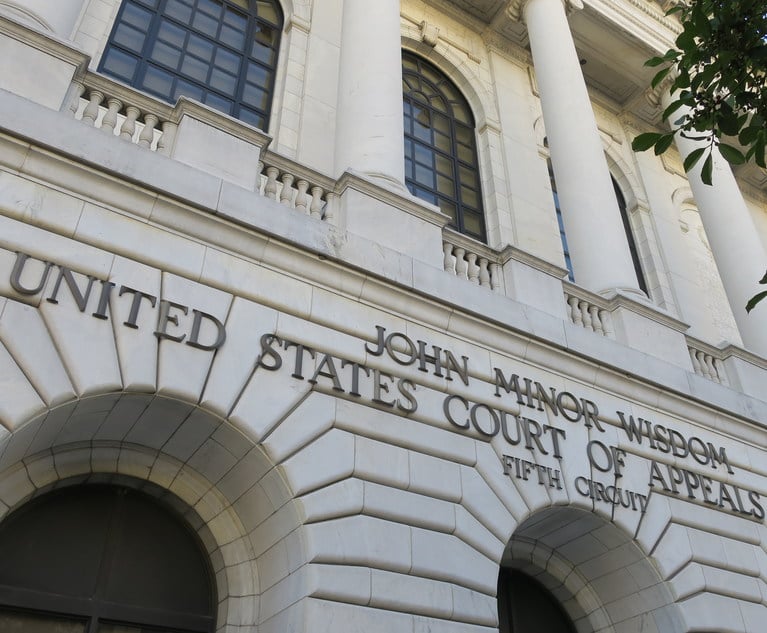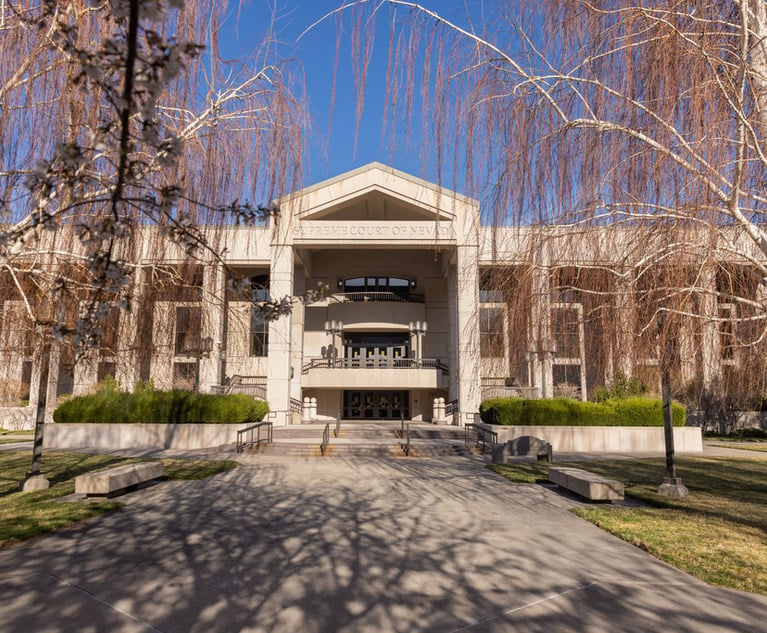Trump's DOJ Backs Colorado Baker Who Refused Service to Gay Couple
The Trump administration delivered a new blow to the gay and lesbian community on Thursday when the U.S. Justice Department sided against a same-sex couple in a major discrimination case at the U.S. Supreme Court. The Justice Department filed a brief backing a Colorado baker who refused to bake a cake for a gay couple. "Weddings are sacred rites in the religious realm and profoundly symbolic ceremonies in the secular one," Jeffrey Wall, the acting U.S. solicitor general, wrote in the amicus brief.
September 07, 2017 at 04:57 PM
5 minute read
The Trump administration delivered a new blow to the gay and lesbian community on Thursday when the U.S. Department of Justice sided against a same-sex couple in a major discrimination case at the U.S. Supreme Court.
In the case, Masterpiece Cakeshop v. Colorado Civil Rights Commission, baker Jack Phillips challenges rulings that he violated state anti-discrimination laws when he refused to bake a wedding cake for a same-sex couple because, he claimed, it was against his religious beliefs. His lawyers argue the First Amendment speech and free exercise clauses bar the Colorado commission from compelling Phillips, a self-described “artist,” from creating a “custom expression” that he deems objectionable.
In the Justice Department's amicus brief supporting the cake shop, Acting U.S. Solicitor General Jeffrey Wall argued the First Amendment bars application of Colorado's public accommodations law to the baker because it unconstitutionally compels speech.
“Weddings are sacred rites in the religious realm and profoundly symbolic ceremonies in the secular one,” Wall and a team of DOJ lawyers wrote in the brief. “When Phillips designs and creates a custom wedding cake for a specific couple and a specific wedding, he plays an active role in enabling that ritual, and he associates himself with the celebratory message conveyed.”
The DOJ's brief continued: “Forcing Phillips to create expression for and participate in a ceremony that violates his religious beliefs invades his First Amendment rights.” The government said Colorado “has not offered, and could not reasonably offer, a sufficient justification for that compulsion here.”
A Justice Department representative, Lauren Ehrsam, said in a statement Thursday: “The department filed an amicus brief in this case today because the First Amendment protects the right of free expression for all Americans. Although public accommodations laws serve important purposes, they—like other laws—must yield to the individual freedoms that the First Amendment guarantees. That includes the freedom not to create expression for ceremonies that violate one's religious beliefs.”
The Justice department brief supporting Phillips is one of a number of recent Trump administration actions that dismayed the LGBTQ community. The White House recently said it would move to ban transgender people from serving in the military, and the Justice Department lined up against wider gay and lesbian workplace rights in a key discrimination case in the U.S. Court of Appeals for the Second Circuit. In February, the administration announced it was rescinding guidance protecting transgender students' use of public school bathrooms that match their gender identity.
Louise Melling, deputy legal director of the American Civil Liberties Union, in a statement, described the Justice Department's brief in the Masterpiece Cake case as “shocking.”
“This Justice Department has already made its hostility to the rights of LGBT people and so many others crystal clear,” Melling said. “But this brief was shocking, even for this administration. What the Trump administration is advocating for is nothing short of a constitutional right to discriminate.”
The Masterpiece Cakeshop case, which has not yet been scheduled for arguments, is one of the new Supreme Court term's most closely watched cases. Although the petition was filed on July 22, 2016, the case lingered on the docket for nearly a year before the justices on June 26 announced they would hear the case.
Speculation abounded that the reason for the lengthy delay was because the court was reluctant to wade into what would be a contentious case during the presidential campaign. Any action by the justices also was complicated by the vacancy on the court following the death last year of Justice Antonin Scalia. After Justice Neil Gorsuch was confirmed, the court said it would review the Masterpiece Cakeshop case.
The Colorado Civil Rights Commission is represented by Colorado Solicitor General Frederick Yarger. The same-sex married couple, Charlie Craig and David Mullins, is represented by Leslie Cooper of the ACLU. Kristen Waggoner of Alliance Defending Freedom represents Phillips.
Although many states include sexual orientation in their anti-discrimination laws, there have been a number of lawsuits in recent years by business owners defending discrimination charges on the basis of their religious beliefs.
Besides the Masterpiece Cakeshop case, a similar Supreme Court petition was filed in July in Arlene's Flowers v. State of Washington, and Ingersoll.
The Washington Supreme Court in that case said the florist, Barronelle Stutzman, had engaged in sexual orientation discrimination under the Washington Law Against Discrimination by refusing to create custom floral arrangements for a same-sex marriage. Stutzman claimed a conflict with her religious beliefs.
Other recent cases raising religious belief defenses have involved owners of lodging, wedding dress shops, photography services, medical practices and students training to be mental health professionals.
Related Articles:
|- Supreme Court Preview: Blockbuster Cases Likely to Deliver a Contentious, Consequential Fall Term
- SCOTUS Will Review Gay Wedding Cake Case From Colorado
- Trump Administration Lines Up Against EEOC in LGBT Workplace Rights Case
- 3 Key Moments From the Senate's Hearing on Trump's Civil Rights Pick
- LGBTQ Groups Threaten to Sue Trump Over Trans Military Ban
This content has been archived. It is available through our partners, LexisNexis® and Bloomberg Law.
To view this content, please continue to their sites.
Not a Lexis Subscriber?
Subscribe Now
Not a Bloomberg Law Subscriber?
Subscribe Now
NOT FOR REPRINT
© 2025 ALM Global, LLC, All Rights Reserved. Request academic re-use from www.copyright.com. All other uses, submit a request to [email protected]. For more information visit Asset & Logo Licensing.
You Might Like
View All
Legal Issues to Watch in the US Appeals Courts in 2025

Second Circuit Upholds $5M Judgment Against Trump in E. Jean Carroll Case
4 minute read
Divided 5th Circuit Shoots Down Nasdaq Diversity Rules

Nevada Supreme Court to Decide Fate of Groundbreaking Contingency Cap Ballot Measure
5 minute readTrending Stories
- 1Decision of the Day: Uber Cannot Be Held Vicariously Liable for Driver's Alleged Negligent Conduct
- 2TikTok Law and TikTok Politics
- 3California Supreme Court Vacates Murder Conviction in Infant Abuse Case
- 4New York’s Proposed Legislation Restraining Transfer of Real Property
- 5Withers Hires Lawyers, Staff From LA Trusts and Estates Boutique
Who Got The Work
Michael G. Bongiorno, Andrew Scott Dulberg and Elizabeth E. Driscoll from Wilmer Cutler Pickering Hale and Dorr have stepped in to represent Symbotic Inc., an A.I.-enabled technology platform that focuses on increasing supply chain efficiency, and other defendants in a pending shareholder derivative lawsuit. The case, filed Oct. 2 in Massachusetts District Court by the Brown Law Firm on behalf of Stephen Austen, accuses certain officers and directors of misleading investors in regard to Symbotic's potential for margin growth by failing to disclose that the company was not equipped to timely deploy its systems or manage expenses through project delays. The case, assigned to U.S. District Judge Nathaniel M. Gorton, is 1:24-cv-12522, Austen v. Cohen et al.
Who Got The Work
Edmund Polubinski and Marie Killmond of Davis Polk & Wardwell have entered appearances for data platform software development company MongoDB and other defendants in a pending shareholder derivative lawsuit. The action, filed Oct. 7 in New York Southern District Court by the Brown Law Firm, accuses the company's directors and/or officers of falsely expressing confidence in the company’s restructuring of its sales incentive plan and downplaying the severity of decreases in its upfront commitments. The case is 1:24-cv-07594, Roy v. Ittycheria et al.
Who Got The Work
Amy O. Bruchs and Kurt F. Ellison of Michael Best & Friedrich have entered appearances for Epic Systems Corp. in a pending employment discrimination lawsuit. The suit was filed Sept. 7 in Wisconsin Western District Court by Levine Eisberner LLC and Siri & Glimstad on behalf of a project manager who claims that he was wrongfully terminated after applying for a religious exemption to the defendant's COVID-19 vaccine mandate. The case, assigned to U.S. Magistrate Judge Anita Marie Boor, is 3:24-cv-00630, Secker, Nathan v. Epic Systems Corporation.
Who Got The Work
David X. Sullivan, Thomas J. Finn and Gregory A. Hall from McCarter & English have entered appearances for Sunrun Installation Services in a pending civil rights lawsuit. The complaint was filed Sept. 4 in Connecticut District Court by attorney Robert M. Berke on behalf of former employee George Edward Steins, who was arrested and charged with employing an unregistered home improvement salesperson. The complaint alleges that had Sunrun informed the Connecticut Department of Consumer Protection that the plaintiff's employment had ended in 2017 and that he no longer held Sunrun's home improvement contractor license, he would not have been hit with charges, which were dismissed in May 2024. The case, assigned to U.S. District Judge Jeffrey A. Meyer, is 3:24-cv-01423, Steins v. Sunrun, Inc. et al.
Who Got The Work
Greenberg Traurig shareholder Joshua L. Raskin has entered an appearance for boohoo.com UK Ltd. in a pending patent infringement lawsuit. The suit, filed Sept. 3 in Texas Eastern District Court by Rozier Hardt McDonough on behalf of Alto Dynamics, asserts five patents related to an online shopping platform. The case, assigned to U.S. District Judge Rodney Gilstrap, is 2:24-cv-00719, Alto Dynamics, LLC v. boohoo.com UK Limited.
Featured Firms
Law Offices of Gary Martin Hays & Associates, P.C.
(470) 294-1674
Law Offices of Mark E. Salomone
(857) 444-6468
Smith & Hassler
(713) 739-1250










